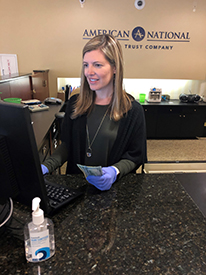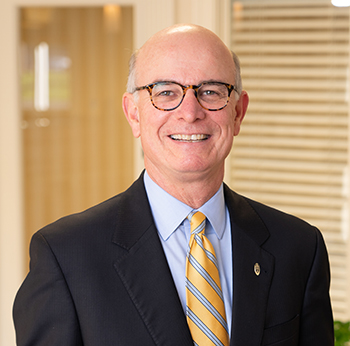‘Talk to your banker today,’ Va. Bankers Assoc. president says
Banks still open for businesses but are settling in to their new normal.
Sydney Lake //March 30, 2020//
‘Talk to your banker today,’ Va. Bankers Assoc. president says
Banks still open for businesses but are settling in to their new normal.
Sydney Lake //March 30, 2020//
Virginia Business virtually sat down with Virginia Bankers Association President and CEO Bruce Whitehurst and Chairman Jeff Haley, who is also president and CEO of Danville-based American National Bank & Trust Co. This is part of an ongoing series of conversations with Virginians about how their work lives and businesses have changed during the pandemic.
Virginia Business: How have banks been adapting to the crisis?
Haley: We converted to appointment-only in our lobbies last Friday. And I would tell you, No. 1, that the entire banking industry — not just American National — is fully operational. We’re just doing it a little differently. Teller transactions do appear to be down, maybe 20%, from the same period a year ago. Our ATM transactions appear to be fairly normal. Our customers have just reacted in such a positive manner. We have our customers calling and checking on us. Occasionally drive-thru lines will be a little longer, but the report I’m getting from my people is, it’s nothing unbearable. It’s a new normal for us right now.
Whitehurst: It’s incredibly helpful that we’re in an era now where, with communications technology, that you can do so much banking on your phone or computer. A lot of banks have increased remote deposit limits so that you can deposit a larger check with your phone. A lot of banks are having as many people as can work from home that are not in the retail banking environment.

Haley: Yesterday, we had 21% of our total workforce working from home. This number is going to change, but yesterday we had about 120 people working in our 26 branches. So when we went [appointment]-only, we asked all of our retail people to continue coming to work because we didn’t know what the new norm was going to be like. We’re going to dial that back and give our employees that work in the branches kind of a break. We’re working on an A-B schedule.
In Southwest Virginia, the internet is actually an issue, so we have sent some people home to work from home, and they didn’t have the internet capacity to do what their job required. That’s an issue for not people in Richmond, but it is for the Southwest Virginia people.
VB: Have there been any cybersecurity issues in the industry thus far?
Haley: Zero have been known. The issue we were having was the capacity of what that person was trying to do at work, the flow of information. If they were out in Pittsylvania County somewhere and there wasn’t good WiFi service, they couldn’t do their work.
Whitehurst: I haven’t heard of any cybersecurity issues. We’re talking about an industry that has been hyper-focused on cybersecurity for as long as data breaches have been an issue. That has led to banks being among the top industries for having contingency plans, for having backup technology and for checking the security of their systems on an ongoing basis.
Haley: Fraud is going to be rampant with this issue. And so the industry collectively will be warning against fraud. Particularly, our industry certainly focuses on elder abuse. So I would just caution everybody about the fraud that’s going to be going on. It’s going to be off the charts. Everybody needs to be very careful on that topic.
VB: How are different generations of customers handling the transitions banks are making?
Haley: We are finding many customers, young and old alike, that were not using our online capabilities, or mobile banking, are starting to use them. We’re seeing enrollment for that go up. A customer can still come into our branch, and most are doing appointments if they have a critical need.

VB: How are banks preparing or changing the ways that they carry out their loan processes?
Haley: American National has a program in place — and I would tell you just about every bank does — where we are deferring principal interest or converting loans to interest-only, for a period of time to give the borrower relief. Every case is different, and we work with the customer for whatever solution is best for them. All types of loans for consumer mortgages, small businesses, big commercial loans, all of them are calling and inquiring, and the industry is prepared to help. We’ve got plenty of capital. Our asset quality is very good. So we all stand ready to do this.
As the [federal CARES Act] bill passes, the [Small Business Association] will get the final details out to us — I’m told by April 7. Then, the industry is going to have to tool up on the details of how to get the data, how to process their loans, close the loans, do all that. I think it’s going to take a little longer than is maybe being reported. There’s so many things as bankers that we don’t know about the SBA program.
Whitehurst: Because of what the Fed has done with interest rates, we have the lowest 30-year mortgage rate that anyone’s ever seen in our lifetimes. And so there is actually a lot of refinance activity going on because people are home and they might have a little more time than usual to actually think about refinancing their mortgages.
Now, we all know that the hospitality industry — it’s like a door was slammed with the coronavirus. So there’s a lot of pressure to get this humongous SBA loan package through. Figuring out the mechanics of how a loan program of this scale will actually work, what communication has to happen between the SBA and every bank are all yet to be determined. There’s a lot of information flying around about how this is all going to go. A lot of it is speculative information because we don’t have the details yet.
There is more help on the way for these businesses that have been affected for the people who have been furloughed or laid off. Last week we had the largest increase in unemployment filings that this country’s ever had. So we’re in extraordinary times. And yet, we’re also seeing all kinds of creativity and ways to help customers.
If anyone is affected by, or feels like they will be affected by the situation, they should be talking to their banker right now. Don’t wait. Talk to your banker today — make a phone call and start some dialogue about what your options are. It’s really important.
Haley: We’re only as good as the communities in which we work and live. My peers are concerned about nonprofits and the critical needs that are going on in their communities — the homeless shelters, the food banks. Our industry is critical to many of the communities — we’re a faucet for capital. Our industry is going to do what it can to make all these communities successful.
For more resources about banking during the coronavirus, visit VBA’s website.
If you are a Virginia worker or business owner who has a story to tell, contact us.
F

















